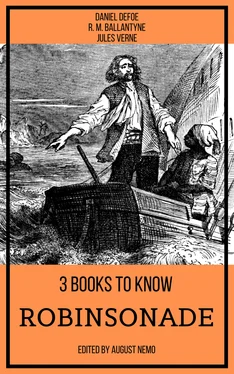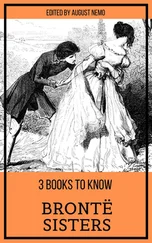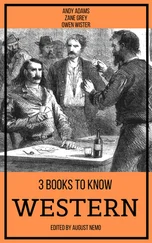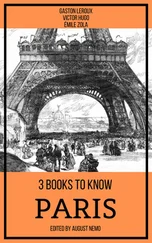Now, as we continued on our way, I pondered much over this new discovery and the singular appearance of these birds, of which Jack could only give us a very slight and vague account; and I began to long to commence our boat, in order that we might go and inspect them more narrowly. But by degrees these thoughts left me, and I began to be much taken up again with the interesting peculiarities of the country which we were passing through.
The second night we passed in a manner somewhat similar to the first — at about two-thirds of the way round the island, as we calculated — and we hoped to sleep on the night following at our bower. I will not here note so particularly all that we said and saw during the course of this second day, as we did not make any further discoveries of great importance. The shore along which we travelled, and the various parts of the woods through which we passed, were similar to those which have been already treated of. There were one or two observations that we made, however, and these were as follows:
We saw that, while many of the large fruit-bearing trees grew only in the valleys, and some of them only near the banks of the streams, where the soil was peculiarly rich, the cocoa-nut palm grew in every place whatsoever — not only on the hillsides, but also on the seashore, and even, as has been already stated, on the coral reef itself, where the soil, if we may use the name, was nothing better than loose sand mingled with broken shells and coral rock. So near to the sea, too, did this useful tree grow, that in many places its roots were washed by the spray from the breakers. Yet we found the trees growing thus on the sands to be quite as luxuriant as those growing in the valleys, and the fruit as good and refreshing also. Besides this, I noticed that on the summit of the high mountain, which we once more ascended at a different point from our first ascent, were found abundance of shells and broken coral formations, which, Jack and I agreed, proved either that this island must have once been under the sea, or that the sea must once have been above the island: in other words, that as shells and coral could not possibly climb to the mountain-top, they must have been washed upon it while the mountain-top was on a level with the sea. We pondered this very much; and we put to ourselves the question, “What raised the island to its present height above the sea?” But to this we could by no means give to ourselves a satisfactory reply. Jack thought it might have been blown up by a volcano; and Peterkin said he thought it must have jumped up of its own accord! We also noticed, what had escaped us before, that the solid rocks of which the island was formed were quite different from the live coral rocks on the shore, where, the wonderful little insects were continually working. They seemed, indeed, to be of the same material — a substance like limestone; but while the coral rocks were quite full of minute cells in which the insects lived, the other rocks inland were hard and solid, without the appearance of cells at all. Our thoughts and conversations on this subject were sometimes so profound that Peterkin said we should certainly get drowned in them at last, even although we were such good divers! Nevertheless, we did not allow his pleasantry on this and similar points to deter us from making our notes and observations as we went along.
We found several more droves of hogs in the woods, but abstained from killing any of them, having more than sufficient for our present necessities. We saw, also, many of their footprints in this neighbourhood. Among these we also observed the footprints of a smaller animal, which we examined with much care, but could form no certain opinion as to them. Peterkin thought they were those of a little dog, but Jack and I thought differently. We became very curious on this matter, the more so that we observed these footprints to lie scattered about in one locality, as if the animal which had made them was wandering round about in a very irregular manner and without any object in view. Early in the forenoon of our third day we observed these footprints to be much more numerous than ever, and in one particular spot they diverged off into the woods in a regular beaten track, which was, however, so closely beset with bushes that we pushed through it with difficulty. We had now become so anxious to find out what animal this was, and where it went to, that we determined to follow the track and, if possible, clear up the mystery. Peterkin said, in a bantering tone, that he was sure it would be cleared up, as usual, in some frightfully simple way, and prove to be no mystery at all!
The beaten track seemed much too large to have been formed by the animal itself, and we concluded that some larger animal had made it, and that the smaller one made use of it. But everywhere the creeping plants and tangled bushes crossed our path, so that we forced our way along with some difficulty. Suddenly, as we came upon an open space, we heard a faint cry, and observed a black animal standing in the track before us.
“A wild cat!” cried Jack, fitting an arrow to his bow, and discharging it so hastily that he missed the animal, and hit the earth about half-a-foot to one side of it. To our surprise, the wild cat did not fly, but walked slowly towards the arrow and snuffed at it.
“That’s the most comical wild cat I ever saw!” cried Jack.
“It’s a tame wild cat, I think,” said Peterkin, levelling his spear to make a charge.
“Stop!” cried I, laying my hand on his shoulder. “I do believe the poor beast is blind. See, it strikes against the branches as it walks along. It must be a very old one;” and I hastened towards it.
“Only think,” said Peterkin with a suppressed laugh, “of a superannuated wild cat!”
We now found that the poor cat was not only blind, or nearly so, but extremely deaf, as it did not hear our footsteps until we were quite close behind it. Then it sprang round, and, putting up its back and tail, while the black hair stood all on end, uttered a hoarse mew and a fuff.
Poor thing said Peterkin, gently extending his hand and endeavouring to pat the cat’s head. “Poor pussy! chee, chee, chee! puss, puss, puss! cheetie pussy!”
No sooner did the cat hear these sounds than all signs of anger fled, and advancing eagerly to Peterkin, it allowed itself to be stroked, and rubbed itself against his legs, purring loudly all the time, and showing every symptom of the most extreme delight.
“It’s no more a wild cat than I am!” cried Peterkin, taking it in his arms; “it’s quite tame. — Poor pussy! cheetie pussy!”
We now crowded around Peterkin, and were not a little surprised — and, to say truth, a good deal affected — by the sight of the poor animal’s excessive joy. It rubbed its head against Peterkin’s cheek, licked his chin, and thrust its head almost violently into his neck, while it purred more loudly than I ever heard a cat purr before, and appeared to be so much overpowered by its feelings that it occasionally mewed and purred almost in the same breath. Such demonstrations of joy and affection led us at once to conclude that this poor cat must have known man before, and we conjectured that it had been left either accidentally or by design on the island many years ago, and was now evincing its extreme joy at meeting once more with human beings. While we were fondling the cat and talking about it, Jack glanced round the open space in the midst of which we stood.
“Hallo!” exclaimed he; “this looks something like a clearing. The axe has been at work here. Just look at these tree-stumps.”
We now turned to examine these, and without doubt we found trees that had been cut down here and there, also stumps and broken branches — all of which, however, were completely covered over with moss, and bore evidence of having been in this condition for some years. No human footprints were to be seen either on the track or among the bushes, but those of the cat were found everywhere. We now determined to follow up the track as far as it went, and Peterkin put the cat down; but it seemed to be so weak, and mewed so very pitifully, that he took it up again and carried it in his arms, where in a few minutes it fell sound asleep.
Читать дальше












